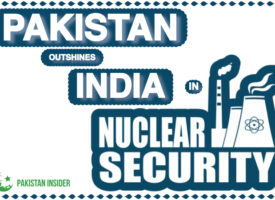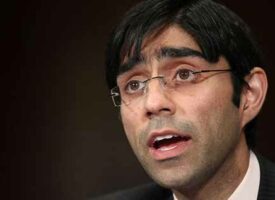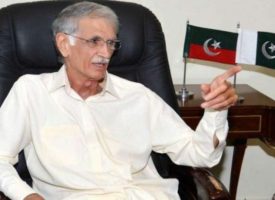Tag "nuclear"
An International Atomic Energy Association (IAEA) delegation by by Head of IAEA’s Nuclear Security Division Mr Raja Abdul Aziz Raja Adnan visited Pakistan from 4-7 December to strengthen existing levels of cooperation. The visiting dignitary from IAEA commended nuclear security measures emplaced by the administration of Pakistan Nuclear Regulatory Authority (PNRA), which oversees nuclear safety and security matters. Islamabad has taken concerted steps to follow international best practices recommended by
Reports sourced from chatter on Twitter reveal that India’s nuclear power infrastructure is being targeted by as-yet unknown cyber intruders. It is now known that the Kudankulam Nuclear Power Plant (KKNPP) in Tamil Nadu was a victim of cyber intrusion. On 28th October, a handle associated with the network security community brought the matter to light by tagging Brian Bartholomew, a prominent researcher at Kaspersky Lab. https://t.co/aBVxrJKIao Interesting potential DTRACK
Veteran diplomat Ambassador Munir Akram has been appointed Pakistan’s Permanent Representative to the United Nations in place of Ambassador Maleeha Lodhi. The move follows Prime Minister Imran Khan’s successful address at the 74th session of the UN General Assembly. The timing of Ambassador Akram’s appointment has surprised many in Pakistan itself, let alone the world at large. From the optics, the Pakistani delegation seemed pretty satisfied in New York, with
Dr Moeed Wasim Yusuf, a renowned scholar of South Asian strategic stability and security studies, has been appointed pioneer Chairperson of the Strategic Policy Planning Cell (SPPC) under the National Security Division (NSD) for a period of two years through an Establishment Division notification issued on 25th September. He holds a PhD in Political Science from Boston University, US. The PTI government of PM Imran Khan began the process to
India’s purported “strikes” on Balakot passed. Cease Fire Violations (CFVs) along the LoC by Indian security forces are on the rise. Meanwhile, the BJP leadership is flexing its muscles, issuing hard-worded statements with long-term implications. Defence Minister Rajnath Singh, former Home Minister a reformist czar, recently suggested his country may not necessarily abide by the No First Use (NFU) nuclear policy. In Pakistan, the absence of a functioning Defence Minister
The recent wave of uncertainty and intimidation in Indian-occupied Jammu & Kashmir by Prime Minister Narendra Modi’s government should not come as a surprise. The deployment of thousands of troops, house arrest of prominent Kashmiri politicians and abrupt area-wise shutdown of Internet services may suggest preparations for war. Perhaps more so when viewed in the context of field testing the concept of Integrated Battle Groups (IBGs) for swift proactive offensive
The Worldfolio, a renowned global content service provider, released a report in October acknowledging the increased political and economic stability in Pakistan. The report specially noted that terrorist incidents had declined by 70% in 2015 as compared to 2014. Pakistan Insider presents a timeline of the most prominent events from the previous year which showcases improvements in domestic and foreign-assisted programs to counter terrorism, violence and extremism. The timeline will
The race for nuclear technology in South Asia began as early as 1944 when Dr Homi Jehangir Bhabha (known as the father of India’s nuclear program) founded the Tata Institute of Fundamental Research (TIFR) devoted to nuclear studies. Efforts by Bhabha and his associates were gaining attention of statesmen such as Jawaharlal Nehru, founder of an otherwise dialogue-centric Nehruvian school of thought which prioritizes talks over military might. On June







